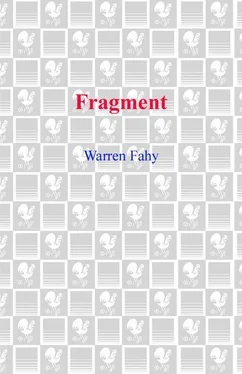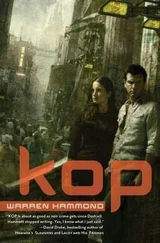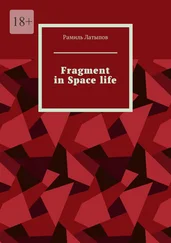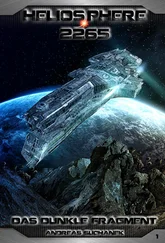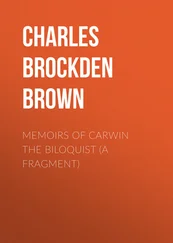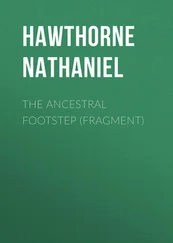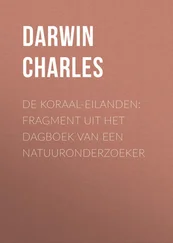Warren Fahy - Fragment
Здесь есть возможность читать онлайн «Warren Fahy - Fragment» — ознакомительный отрывок электронной книги совершенно бесплатно, а после прочтения отрывка купить полную версию. В некоторых случаях можно слушать аудио, скачать через торрент в формате fb2 и присутствует краткое содержание. Жанр: Путешествия и география, на английском языке. Описание произведения, (предисловие) а так же отзывы посетителей доступны на портале библиотеки ЛибКат.
- Название:Fragment
- Автор:
- Жанр:
- Год:неизвестен
- ISBN:нет данных
- Рейтинг книги:5 / 5. Голосов: 1
-
Избранное:Добавить в избранное
- Отзывы:
-
Ваша оценка:
- 100
- 1
- 2
- 3
- 4
- 5
Fragment: краткое содержание, описание и аннотация
Предлагаем к чтению аннотацию, описание, краткое содержание или предисловие (зависит от того, что написал сам автор книги «Fragment»). Если вы не нашли необходимую информацию о книге — напишите в комментариях, мы постараемся отыскать её.
Fragment — читать онлайн ознакомительный отрывок
Ниже представлен текст книги, разбитый по страницам. Система сохранения места последней прочитанной страницы, позволяет с удобством читать онлайн бесплатно книгу «Fragment», без необходимости каждый раз заново искать на чём Вы остановились. Поставьте закладку, и сможете в любой момент перейти на страницу, на которой закончили чтение.
Интервал:
Закладка:
He raised a hand to the easel beside him that announced tonight’s topic:
Predator and Prey:
Another round of whistles, applause, and jeers rose.
Geoffrey took refuge behind the lectern and began.
“Good evening, ladies and gentlemen. First-a brief history of the world.”
A ripple of amusement crossed the audience as they settled in and the lights dimmed.
Geoffrey clicked a remote, and an artist’s rendering of two worlds colliding appeared on the screen behind him.
“After a Mars-sized planet collided with ours and penetrated her surface, spewing a molten plume of ejecta that would congeal into the Moon, Mother Earth remained a cooling ball of lava for a hundred million years.”
Geoffrey clicked to a close-up of the full Moon over the ocean.
“It was this fantastic violence that ironically created the hand that rocked the cradle of life. Four billion years ago, as Earth’s lunar child circled in low orbit, the first oceans were churned by its wrenching tides. Four hundred million years later, the Earth and Moon would be bombarded by another wave of massive impacts as our fledgling solar system continued to work out the kinks in the clockwork we observe today.”
He clicked to a scene of what looked like outer space scattered with clusters of colored spheres.
“During this inconceivably violent age, known as the Archean Eon, the first self-copying molecules coalesced in Earth’s oceans. Such molecules are easily re-created in our laboratories using the same inorganic ingredients and forces that bombarded our planet’s primordial seas. During the next billion years, the accumulation of replication errors in these molecules created RNA, which not only replicated itself but catalyzed chemical reactions like a primitive metabolism! RNA’s replication errors led to the evolution of DNA-a molecule more stable than RNA that could copy itself more accurately and manufacture RNA.”
Geoffrey clicked to a computer-generated image of a DNA molecule.
“From this self-copying molecular machine, the earliest life emerged as a simple organization of chemical reactions. The first crude bacteria harnessed methane, sulfur, copper, sunlight, and possibly even thermal energy venting in the dark depths of the ocean to fuel these metabolic processes.”
The next slide showed a variety of simple forms that looked like primitive prokaryotic cells.
“The first crude organisms collided and sometimes consumed one another, blending their genetic material. A minute percentage of these blendings bestowed advantages on the resulting hybrids.”
Geoffrey clicked through images of waves crashing on shores.
“If you combine extreme tides caused by the nearby Moon, which is still drifting about two inches farther away from the Earth each year, with the constant bombardment of ultraviolet radiation from the sun, then stir and cook the primordial soup for one and a half billion years, you get the most significant innovation in the story of life.”
Geoffrey clicked the remote, and the next slide sent giggles through his audience.
“Yes, my friends, it looks like a sperm cell, but it’s actually a tailed protozoan called Euglena viridis. It is an individual animal, a unique species, a single-celled organism remarkably similar to sperm. The primordial sea had produced the first creatures with the ability to hunt , using thrashing tails to chase down other single-celled organisms and consume them. Sometimes these first predators actually exploited the reproductive systems of their prey to facilitate their own reproduction-and sometimes their prey perpetuated itself by hijacking the genes of its attacker.
“In either case, the proposition of tonight’s Chat is that these very first hunters and their prey created a new and mutually beneficial relationship that we call sex. When certain cells began to specialize in consuming or penetrating other cells for reproduction, others cells specialized in hosting reproduction itself, thus deflecting death and perpetuating both lines of DNA. Sex is the peace treaty between predator and prey. The offspring of their union not only combined the properties of both but carried forward each original single-celled organism, now modified as sperm and egg. So there you have the kindling for tonight’s Fire-Breathing Chat, ladies and germs. I submit that sex began at the very beginning with single-celled organisms. I propose that the answer to the age-old question, which came first, the chicken or the egg, is the egg… and the sperm.” Geoffrey stepped aside from the podium and bowed.
Shouts came from the back of the auditorium. Uncomfortable groans rose from the scientists in the front rows, especially from the gray hairs.
Geoffrey clicked to the next slide-a human egg wreathed by wriggling sperm-and he paused to enjoy the slightly nervous titter of recognition that the image always evoked from an audience.
“Egg and sperm may actually be the living echo of a revolutionary moment that transpired a billion and a half years ago in the ancient seas of Earth. Indeed, I propose that this original love story has repeated itself in an unbroken chain since reproduction began in eukaryotic cells-that is, cells that have membrane-enclosed nuclei inside them. When the first hunter cells grew tails in order to chase down their prey, the hunted cells made peace, if you will, by absorbing the hunter’s DNA and facilitating its reproduction, thus ensuring both cells’ survival and turning a war into a partnership.
“And since the sharing of genetic material led to a convergent variation in the morphology of their offspring, this innovation accelerated the evolution of superior forms in tandem, continuing to ensure the survival of both kinds of original cell in male and female carriers. And the elaboration of multicellular life issuing from that ever-accelerating partnership would launch both of the original organisms into wildly diverse environments.”
The grumblings grew louder in the audience. Geoffrey raised his voice mildly.
“I suggest that this proposition is validated each time sperm penetrates an egg and results in an offspring. All complex life may have developed simply to stage this age-old dance of two singlecelled species. From octopi to humans to whales to ferns, countless expressions of life on Earth stage this original single-celled rendezvous, just as it occurred in ancient seas, in order to reproduce.”
The audience muttered and shuffled as Geoffrey reached his peroration.
“So why are such complex animals beneficial for continuing the partnership of sperm and egg? Because, ladies and gentlemen, unlike sperm and egg, animals can exploit an amazing variety of changing conditions and environments through evolution. We sexually reproducing animals are an astonishingly diversified fleet of sperm-and-egg-carriers that bring the ancient seas with us into ever-new environmental frontiers.
“Of course, such elaborate vehicles were also beneficial to the replication of the original single-celled organisms because they have more fun replicating than single-celled organisms. There’s nothing like improved incentives to increase output. But I think we’ll leave that topic for another chat.”
Geoffrey bowed once again, this time to an enthusiastic ovation, unfazed by the jeers and scowls from the front row.
Now the real fun began. He took the first torpedo from a particularly vexed colleague right in front of him. “Yes, Dr. Stoever?”
“Well, I don’t know where to begin, Geoffrey,” the baldheaded scientist drawled forlornly. “Sex began with isogamous gametes: two sex cells of the same size fusing together and joining their DNA, which then divided into more cells with a recombination of the two cells’ genes. It did not begin with ancestors of sperm and egg! I’ve never heard of such a preposterous theory!”
Читать дальшеИнтервал:
Закладка:
Похожие книги на «Fragment»
Представляем Вашему вниманию похожие книги на «Fragment» списком для выбора. Мы отобрали схожую по названию и смыслу литературу в надежде предоставить читателям больше вариантов отыскать новые, интересные, ещё непрочитанные произведения.
Обсуждение, отзывы о книге «Fragment» и просто собственные мнения читателей. Оставьте ваши комментарии, напишите, что Вы думаете о произведении, его смысле или главных героях. Укажите что конкретно понравилось, а что нет, и почему Вы так считаете.
